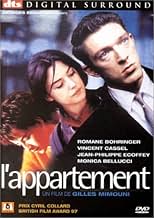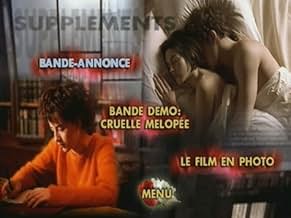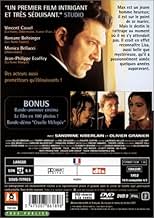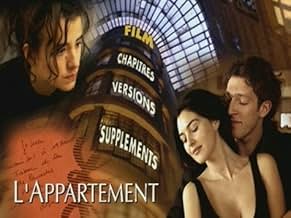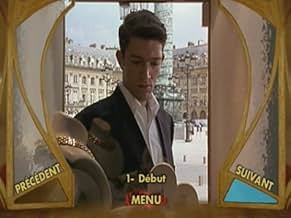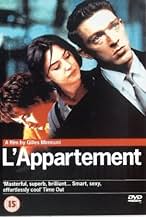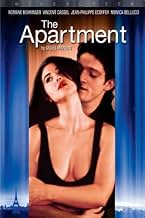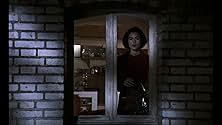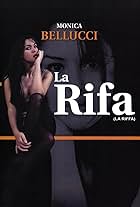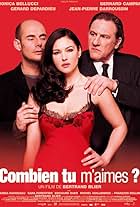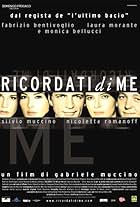A recently engaged man sees a former lover and becomes obsessed with meeting her again.A recently engaged man sees a former lover and becomes obsessed with meeting her again.A recently engaged man sees a former lover and becomes obsessed with meeting her again.
- Won 1 BAFTA Award
- 2 wins & 3 nominations total
- Director
- Writer
- All cast & crew
- Production, box office & more at IMDbPro
Featured reviews
10lctorana
This is a fabulous film.
The plot is a good yarn, and is imaginatively told in a series of flashbacks and alternative points of view. What was deliberate, and what was coincidence? Who is in love with who?
You get the chance to put yourselves in the shoes of each of the characters in turn (sometimes literally), and this helps define each character to a satisfying depth.
With a bit of effort following the twists and turns, you can understand each of the characters; and key events in the film are reshot from the point of view of different people.
Take the opportunity if it comes again to your arthouse cinema; it looks good on the big screen.
More than keeping you guessing, the plot twists to such an extent that you just sit and watch what unfolds - I defy anyone to predict!
But more likely you will need more than one viewing - I saw this at the pictures on its original release three times, and it got better each time.
The acting was very good, with a standout performance by Romane Bohringer as Alice torn in three directions by the three other characters in the ensemble.
A classic. The second-best film of the 1990s.
The plot is a good yarn, and is imaginatively told in a series of flashbacks and alternative points of view. What was deliberate, and what was coincidence? Who is in love with who?
You get the chance to put yourselves in the shoes of each of the characters in turn (sometimes literally), and this helps define each character to a satisfying depth.
With a bit of effort following the twists and turns, you can understand each of the characters; and key events in the film are reshot from the point of view of different people.
Take the opportunity if it comes again to your arthouse cinema; it looks good on the big screen.
More than keeping you guessing, the plot twists to such an extent that you just sit and watch what unfolds - I defy anyone to predict!
But more likely you will need more than one viewing - I saw this at the pictures on its original release three times, and it got better each time.
The acting was very good, with a standout performance by Romane Bohringer as Alice torn in three directions by the three other characters in the ensemble.
A classic. The second-best film of the 1990s.
This is an astonishing film: a romantic thriller with a convoluted but perfectly constructed and devastatingly symmetrical plot, brilliantly buttressed by the use of recurring visual motifs. Everything in it is beautifully filmed: the women, the apartments; but more amazing is the devastating juxtapositioning of images, almost every scene has echoes of another. This is a story told in light, in colour, in many almost-parallels. Every time I watch it, it fills me with delight.
The acting is great too. Romane Bohringer is stunning as a woman on the verge of a nervous breakdown: everything about her changes with her mood. Vincent Cassel plays a very different role to his part in La Haine; but no less excellently: shifty and sympathetic at the same time. And Monica Bellucci - ah!, Monica Bellucci, well, put simply, she plays (is?) the world's most perfect woman. There's one small scene about three quarters of the way through where she does nothing more than smile; yet in that instant, says more than hours of Hollywood junk.
One cannot do justice to this film without at least mentioning the superb, sequential climax: sad, shocking, ironic and subtle in turn. But if one moment captures the brilliance of this work, it's the scene at the start of this fabulous denouement, the prospect of which has been teasingly laid before us throughout the entire story. Yet when the moment comes, it is handled so delicately, so briefly, so deftly, that on reflection it makes you gasp. Only a director of staggering confidence would dare to underplay this vital point. But the confidence is justified. Cinema doesn't come much better than this.
The acting is great too. Romane Bohringer is stunning as a woman on the verge of a nervous breakdown: everything about her changes with her mood. Vincent Cassel plays a very different role to his part in La Haine; but no less excellently: shifty and sympathetic at the same time. And Monica Bellucci - ah!, Monica Bellucci, well, put simply, she plays (is?) the world's most perfect woman. There's one small scene about three quarters of the way through where she does nothing more than smile; yet in that instant, says more than hours of Hollywood junk.
One cannot do justice to this film without at least mentioning the superb, sequential climax: sad, shocking, ironic and subtle in turn. But if one moment captures the brilliance of this work, it's the scene at the start of this fabulous denouement, the prospect of which has been teasingly laid before us throughout the entire story. Yet when the moment comes, it is handled so delicately, so briefly, so deftly, that on reflection it makes you gasp. Only a director of staggering confidence would dare to underplay this vital point. But the confidence is justified. Cinema doesn't come much better than this.
A wonderful story about the consequences of obsessive love with the beautiful romantic back streets of Paris as its location. We're transported through time and see the plot develop from the perspectives of the three main characters as the mystery unwinds.
After two years working in New York in the 90's, the successful executive Max Mayer (Vincent Cassel) returns to Paris and will sooner get married to his fiancée Muriel (Sandrine Kiberlain). He has a meeting in a restaurant with Japanese executives and then he will travel to Tokyo. However, he glances at a woman leaving a telephone booth and he believes she is Lisa (Monica Bellucci), the greatest love of his life who had disappeared years ago. He finds the key of a Parisian hotel room in the booth and he calls off his trip to Tokyo trying to meet Lisa in the hotel. He sneaks into the empty room; finds an obituary and goes to the cemetery expecting to find Lisa. Then he follows the stranger Daniel (Olivier Granier), whose name he had overheard in the booth cabin, and finds an apartment that he supposes is Lisa address. Meanwhile Max recalls his romance with Lisa in flashbacks. Max borrows the car of his best friend Lucien (Jean-Philippe Écoffey), who is in love with his girlfriend Alice, to go to the apartment wait for Lisa. However, he finds another woman also called Lisa (Romane Bohringer). The mystery is clarified through the flashbacks.
"L'Appartement" is an intriguing thriller about missing encounters, obsession and serendipities with a disappointing and incoherent conclusion. The non-linear screenplay keeps the mystery until the very end. The performances of Vincent Cassel, Monica Bellucci and Jean- Philippe Écoffey are excellent, but the sexy Romane Bohringer steals the movie in the role of an outcast woman obsessed by her only girlfriend. Unfortunately there are many flaws and holes in the story.
The first one is indeed a continuity mistake, with Max's scarf vanishing when meets Lucien in the stairway and in the restaurant, but back around his neck when he goes to the airport.
There are questions not answered: Why Lisa had lodged in a hotel in Paris if she has her own apartment? How Alice financially supports herself? Why Max stays with Muriel in the end? Why Lisa trusted on a single letter, instead of looking for Lucien and asking Max's address in New York and send an ultimate letter?
My interpretation of the plot is that the lonely and needy Alice is obsessed by Lisa and creates all the missing encounters to avoid Lisa to meet Max and leave her alone again. But in the end, she finds that Max desires and loves her and she unexpectedly falls in love with Max. Therefore, she does not need Lisa anymore. However, my interpretation seems to be wrong based on the reaction of Max after reading her diary. But again, Alice is a manipulative woman and the viewer never knows neither what is written in her journal (maybe the real feelings of the true Lisa) nor her conversation without audio with Lisa. Further, Max is a romantic man that has never acknowledged the love of Lisa with him and believe his feelings are unrequited love.
There are references to "Rear Window" and "Single White Female", but nevertheless, the terrible conclusion does not make any sense. My vote is seven.
Title (Brazil): "O Apartamento" ("The Apartment")
"L'Appartement" is an intriguing thriller about missing encounters, obsession and serendipities with a disappointing and incoherent conclusion. The non-linear screenplay keeps the mystery until the very end. The performances of Vincent Cassel, Monica Bellucci and Jean- Philippe Écoffey are excellent, but the sexy Romane Bohringer steals the movie in the role of an outcast woman obsessed by her only girlfriend. Unfortunately there are many flaws and holes in the story.
The first one is indeed a continuity mistake, with Max's scarf vanishing when meets Lucien in the stairway and in the restaurant, but back around his neck when he goes to the airport.
There are questions not answered: Why Lisa had lodged in a hotel in Paris if she has her own apartment? How Alice financially supports herself? Why Max stays with Muriel in the end? Why Lisa trusted on a single letter, instead of looking for Lucien and asking Max's address in New York and send an ultimate letter?
My interpretation of the plot is that the lonely and needy Alice is obsessed by Lisa and creates all the missing encounters to avoid Lisa to meet Max and leave her alone again. But in the end, she finds that Max desires and loves her and she unexpectedly falls in love with Max. Therefore, she does not need Lisa anymore. However, my interpretation seems to be wrong based on the reaction of Max after reading her diary. But again, Alice is a manipulative woman and the viewer never knows neither what is written in her journal (maybe the real feelings of the true Lisa) nor her conversation without audio with Lisa. Further, Max is a romantic man that has never acknowledged the love of Lisa with him and believe his feelings are unrequited love.
There are references to "Rear Window" and "Single White Female", but nevertheless, the terrible conclusion does not make any sense. My vote is seven.
Title (Brazil): "O Apartamento" ("The Apartment")
A very confusing film with nods to Hitchcock, some very good photography and little else. The plot involves the Hitchcock staples of obsession and paranoia but lacks the ultimate touch of the master - suspense. I was told that this film was a 'must see' and how great it was and how wonderful the structure was and how engaging it all was. Well, do not waste the time because this film is a pretentious, overlong piece of French 'style' - lots of visual cleverness and moody pouting (called great acting when it is in a French film) but little substance. At the end you could not care less what happens to these self-obsessed characters and I must have had a bad day because I could not follow a lot of this. The film uses a fragmented narrative by presenting the sequences in flashback and in no particular order. We are shown scenes several times and with new perspectives each time so we can try to make sense of the story, if one can call it that. I had to resort to looking at the characters' hair in order to figure out when things were happening. There was also a great deal of symbolism - red rose, white rose, red walls, white shirts, long hair, short hair, red shoes and on and on and on until I yelled enough! The symbols, of course, go nowhere and are presented in sledgehammer fashion so that we can marvel at how clever it all is even though it makes no sense. This is "Single White Female" meets French pretension made by a director who has studied too many Hitchcock films but failed the exam.
Storyline
Did you know
- TriviaThe play that features Lisa and Alice is 'A Midsummer's Night Dream' by William Shakespeare.
- ConnectionsFeatured in The Movie Show: Episode dated 12 February 1997 (1997)
- SoundtracksSame kind of woman
Words and Music by Peter Chase
- How long is The Apartment?Powered by Alexa
Details
- Release date
- Countries of origin
- Languages
- Also known as
- L'Appartement
- Filming locations
- Rue de Furstemberg, Paris 6, Paris, France(rendez-vous location for Max and Lisa)
- Production companies
- See more company credits at IMDbPro
- Runtime1 hour 56 minutes
- Color
- Sound mix
- Aspect ratio
- 1.66 : 1
Contribute to this page
Suggest an edit or add missing content



